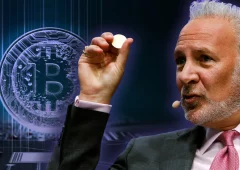Possible Proposals at the Upcoming White House Crypto Meeting
04.03.2025 17:38 2 min. read Alexander Zdravkov
Donald Trump is preparing to host his first-ever cryptocurrency summit at the White House on March 7, an event that has already caused a stir in the crypto market.
Investors are eager to see key announcements, hoping that the summit will address important developments in the crypto sector. Some major updates, such as the launch of a reserve involving XRP, SOL, and ADA, have already been reported. Here are three key things Trump may reveal at the summit:
Clear direction on cryptocurrency regulation
The summit will bring together key figures in the cryptocurrency industry, which could potentially lead to clearer policies and regulations for the sector. Fox Business journalist Eleanor Terrett noted that the event could replace the previously proposed “crypto advisory council.” It could also lay the groundwork for defining digital assets and their future uses.
READ MORE:

Peter Schiff Demands Investigation into Trump’s Alleged Role in Crypto Market Manipulation
Zero tax on crypto
A recent post by crypto analyst John Squire suggests that Trump may announce zero taxes on cryptocurrencies during the summit. If true, it could lead to a sharp spike in the price of Bitcoin and positively impact the broader crypto market.
Expansion of the cryptocurrency strategic reserve
Speculation is growing that Trump will announce additional tokens to be added to the US crypto reserve. Trump’s crypto czar, David Sachs, hinted at this with a tweet in which he stated, “There will be more at the summit,” causing excitement about potential new additions to the reserve.
-
1
Chinese Tech Firms Turn to Crypto for Treasury Diversification
26.06.2025 17:00 1 min. read -
2
FTX Halts Recovery Payments in 49 Countries: Here Is the List
04.07.2025 18:00 2 min. read -
3
What Are the Key Trends in European Consumer Payments for 2024?
29.06.2025 8:00 2 min. read -
4
What Brian Armstrong’s New Stats Reveal About Institutional Crypto Growth
29.06.2025 15:00 2 min. read -
5
Here is Why the Fed May Cut Rates Earlier Than Expected, According to Goldman Sachs
08.07.2025 15:00 2 min. read
U.S. Public Pension Giant Boosts Palantir and Strategy Holdings in Q2
According to a report by Barron’s, the Ohio Public Employees Retirement System (OPERS) made notable adjustments to its portfolio in Q2 2025, significantly increasing exposure to Palantir and Strategy while cutting back on Lyft.
Key Crypto Events to Watch in the Next Months
As crypto markets gain momentum heading into the second half of 2025, a series of pivotal regulatory and macroeconomic events are poised to shape sentiment, liquidity, and price action across the space.
Here is Why Stablecoins Are Booming, According to Tether CEO
In a recent interview with Bankless, Tether CEO Paolo Ardoino shed light on the growing adoption of stablecoins like USDT, linking their rise to global economic instability and shifting generational dynamics.
U.S. Dollar Comes Onchain as GENIUS Act Ushers in Digital Era
In a statement that marks a major policy shift, U.S. Treasury Secretary Scott Bessent confirmed that blockchain technologies will play a central role in the future of American payments, with the U.S. dollar officially moving “onchain.”
-
1
Chinese Tech Firms Turn to Crypto for Treasury Diversification
26.06.2025 17:00 1 min. read -
2
FTX Halts Recovery Payments in 49 Countries: Here Is the List
04.07.2025 18:00 2 min. read -
3
What Are the Key Trends in European Consumer Payments for 2024?
29.06.2025 8:00 2 min. read -
4
What Brian Armstrong’s New Stats Reveal About Institutional Crypto Growth
29.06.2025 15:00 2 min. read -
5
Here is Why the Fed May Cut Rates Earlier Than Expected, According to Goldman Sachs
08.07.2025 15:00 2 min. read

